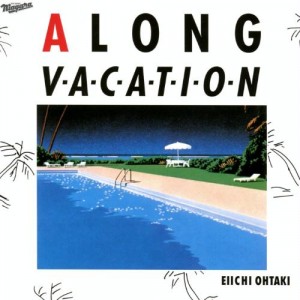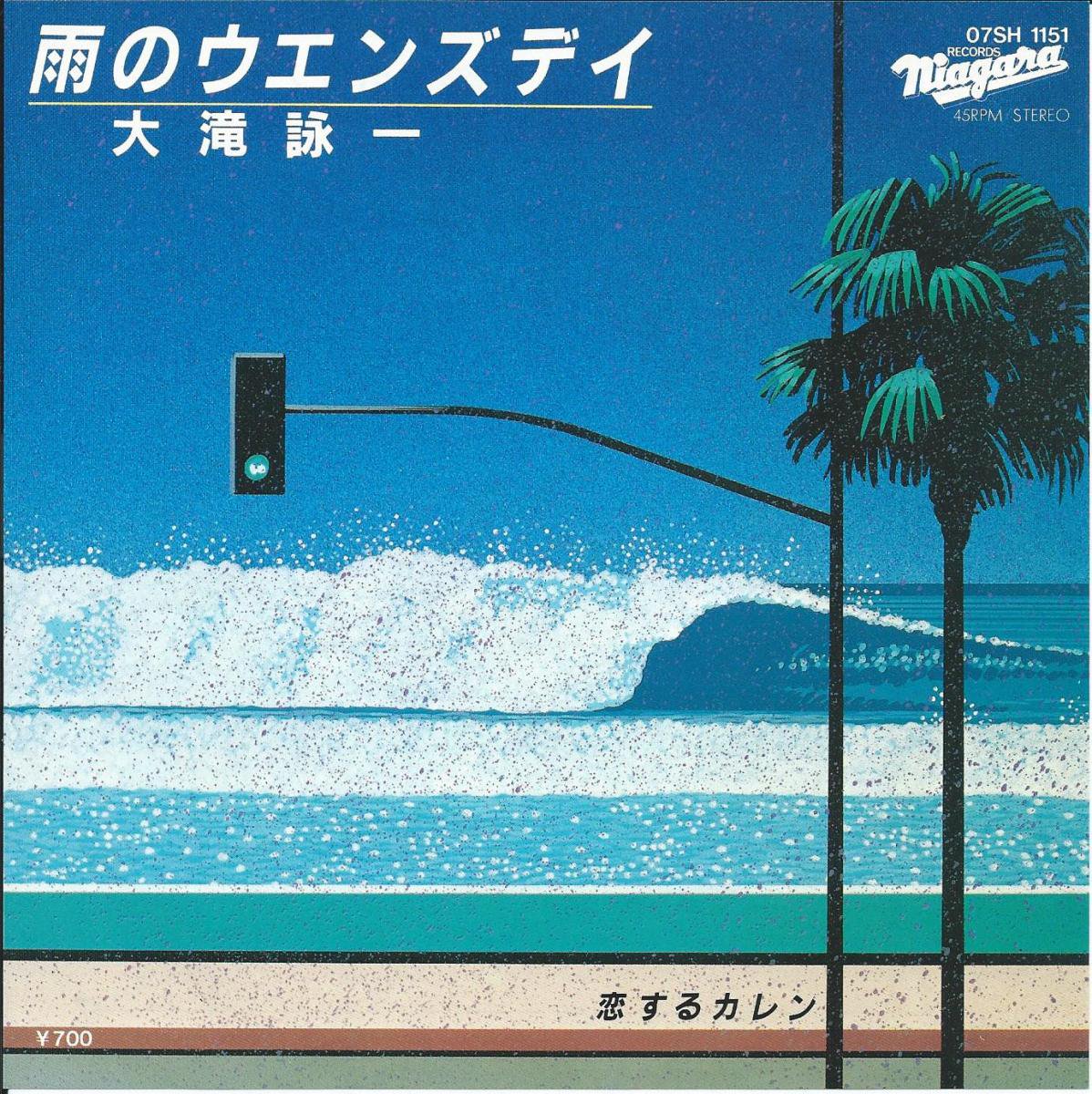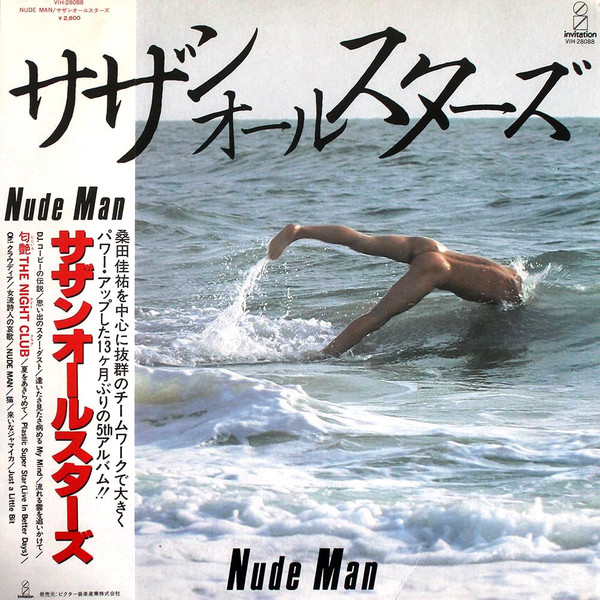
A Long Vacation is an album by the late singer-songwriter, producer, and pioneer,
Eiichi Ohtaki (大滝 詠一). Not only is it an important milestone in the evolution of City Pop, but it's also considered to be one of the greatest Japanese rock albums of all time.
THE HISTORY
 |
| Eiichi Ohtaki in his studio |
A Long Vacation marks an important milestone in Ohtaki's career, it was this record where he perfected his signature "Wall of Sound" production formula inspired by American producer Phil Spector. The album was produced to sound like a live concert, to compliment the 60's Baroque pop-style arrangements. Because of the more orchestral feel, the album has a huge, noteworthy cast of musicians. First and foremost, all of Ohtaki's former
Happy End band-mates have reunited for the first time on a record since their breakup in 1973; Takashi Matsumoto wrote the lyrics for every song except one, Shigeru Suzuki on guitar, and Haruomi Hosono played bass guitar. Other collaborators include Makoto Matsushita (松下誠) & ex-Sugar Babe Kunio Muramatsu (村松 邦男) on guitar, Akira Inoue (井上 鑑) on keyboards, Tin Pan Alley members Masataka Matsutoya (松任谷 正隆) & Tatsuo Hayashi ( 林 立夫), and Jake H Concepcion on flute as opposed to his trademark saxophone. Many other artists are featured as backup singers, such as Singer-songwriter Hiroaki Igarashi (五十嵐浩晃), vocal group The Channels, and female idols Hiromi Ōta (太田 裕美), Raije (ラジ), and The Singers Three.
A Long Vacation was released on March 21, 1981. Initially, sales were sluggish, but as sales gradually increased, reaching 2nd place in the Oricon charts in the summer, only just behind Reflections by singer-actor Akira Terao (寺尾聡). It sold over a million copies and was named "Best Album" at the
23rd Japan Record Awards. A Long Vacation's success is nothing short of a miracle, considering that Ohtaki, and by extension Niagara Records, had been struggling in sales for the past 5 years. About a year and a half later on October 1, 1982, it was selected among the world's first 20 CD titles, making it the 1st Japanese album released ever on CD format.
The famous album cover was drawn by illustrator Hiroshi Nagai, who apparently claims that the musician was inspired by his pieces when composing the songs that became the album. After the album's release, Nagai's popularity skyrocketed as he was flooded with requests for similar work. The artist provided the cover for future albums by Ohtaki as well.
THE MUSIC
:format(jpeg):mode_rgb():quality(90)/discogs-images/R-3636170-1451894527-8714.jpeg.jpg)
- You are Natural Color (君は天然色): The song sets the mood for the whole album as you hear an orchestra running their instruments just before the conductor ready the band. What's followed is a Summery beach arrangement that's equal parts British and California Sunshine pop that encapsulates what Ohtaki called "Japan's version of the Wall of Sound".
- Velvet Motel: A baroque style duet with Raije(?) about a couple's romantic stay at a Motel. What's unique about this song is that occasionally Ohtaki & Raije will playfully finish each other's lines in certain verses.
- In the Canary Islands (カナリア諸島にて): Another relaxing resort pop song about vacationing in the Canary Islands, although lyricist Matsumoto hadn't actually visited them at this point and wrote the song based off on his imagination. When he finally did visit in 1999 for a Carlos Kleiber performance, he found it very different.
- Pap-Pi-Doo-Bi-Doo-Ba Story (物語): A sunshine pop arrangement that's accompanied by goofy-sounding synths mimicking a doo-wop chorus.
- Pinball in My Heart (我が心のピンボール): A vintage sounding surf rock ballad about a fellow lamenting over the rejection from a woman he likes. As the title suggests, his heart is continuously banged off the bumpers of life and romance only to inevitably head down to the bottom hole. This is probably the hardest rock-sounding tack on the album, and Ohtaki sings the lyrics in a very comedic, but still heartfelt manner.
- Rainy Wednesday (雨のウエンズデイ): A smooth, Walker Bros. style ballad about a man fantasizing about the woman he loves (or once loved) while driving his Volkswagen on a rainy day at the beach. This happens to be the song that reunited the original Tin Pan Alley member together for the 1st time in a few years, which would explain the excellent piano work by Matsutoya.
- Speech Balloon: A very basic but still soothing tropical soft rock ballad.
- Karen in Love (恋するカレン): Another chamber-pop ballad that accompanied by an amazing acoustic guitar awesome overdubbed backing chorus by Ohtaki himself. Ohtaki originally wrote the song for the comedy rock band, Slapstick, but remade it to be less comedic and much more romantic. This song is the only multi-synchronized track in the album.
- Fun x 4: A classic "Boy Meets Girl" story told through a fun and bouncy homage to the Beach Boys 1964 classic "Fun, Fun, Fun", it even concludes with the iconic line "Fun, fun, fun now that daddy took the t-bird away." While the story in the song is very cliche, it's told in a very engaging way thanks to vocal cameos by Ōta, who voices the girl who asks the boy out, and Igarashi as the wolf howling at the moon.
- Farewell Trans-Siberian Railway (さらばシベリア鉄道): Composed as a tribute to English record producer, Joe Meek, this galloping surf rock tune sounds straight out of a Spaghetti Western, with lyrics about a lone wolf cowboy archetype and his adventures in the Soviet Union(?). Prior to this version, it was released as a single sung by Hiromi Ōta in November 1980.
 |
|
Despite growing up listening to a lot of surf rock and 60's pop thanks to Los Angeles-based radio station, K-Earth 101, I wasn't immediately sold on Ohtaki's magnum Opus. I didn't hate it or anything, but A Long Vacation just seemed too different than what I was already listening to in terms of 80's j-pop music. But after revisiting some of the album's influences, the Beach Boys, Glen Campbell, The Beatles, Connie Francis, etc. and I took another stab at it and... wow.What can I say except that Eiichi Ohtaki hit the nail on the head? He managed to create incredibly catchy and fun melodies that encapsulate the best elements of the Wall of Sound chamber pop of the 60s and merge it with 1980's nuances. There's also a lot of clever storytelling woven in a lot of these songs that make them both humorous and engaging, like when the boy in Pinball in My Heart starts fantasizing about caressing his crush's luxurious hair only to realize that he forgot to wash his, or how the backing chorus vocally reenacts the sound effects in different verses of FUNx4.
My absolute favorite tune however is easily Rainy Wednesday. It's the most contemporary song on the record, a combination of yacht rock and baroque pop with a little bit of Dionne Warwick's
Walk On By thrown in the mix. Add Ohtaki's ethereal voice, and you've got the perfect song for an evening drive or even staying in on a rainy day. The only songs I didn't care for were
Pap-Pi-Doo-Bi-Doo-Ba Story, where the synth, while creative, kinda got on my nerves, and Speech Balloon, while not a bad song at all, just seemed too vanilla compared to the rest of the arrangements on the album.
:format(jpeg):mode_rgb():quality(90)/discogs-images/R-10994636-1507858890-8222.jpeg.jpg) |
|
Overall though I can hear where all the hype is coming from. If Brian Wilson and Phil Spector ever came together and made a sequel to Pet Sounds, it would sound like A Long Vacation. It rightfully earned its place as one of the most important Japanese albums ever, especially since a lot of the production techniques used in this album, especially the vocal reverb, became staples in City Pop. Just listen to acts like Omega Tribe, Tatsuro Yamashita (山下 達郎), Kaoru Sudo (須藤薫), and even Toshiki Kadomatsu (角松 敏生) , and they all have drawn inspiration from Eiichi Ohtaki in one way or another. Even though he has passed away in 2013, A Long Vacation is a proof that Eiichi Ohtaki left behind one hell of a legacy that will be remembered for years to come. And to that, I hope he enjoys his long vacation.
:format(jpeg):mode_rgb():quality(90)/discogs-images/R-3636170-1451894527-8714.jpeg.jpg)

:format(jpeg):mode_rgb():quality(90)/discogs-images/R-10883084-1505914126-2351.jpeg.jpg)
:format(jpeg):mode_rgb():quality(90)/discogs-images/R-3636170-1451894527-8714.jpeg.jpg)

:format(jpeg):mode_rgb():quality(90)/discogs-images/R-10848401-1505331108-9403.jpeg.jpg)
:format(jpeg):mode_rgb():quality(90)/discogs-images/R-10994636-1507858890-8222.jpeg.jpg)


:format(jpeg):mode_rgb():quality(90)/discogs-images/R-3636170-1451894527-6154.jpeg.jpg)


No comments:
Post a Comment